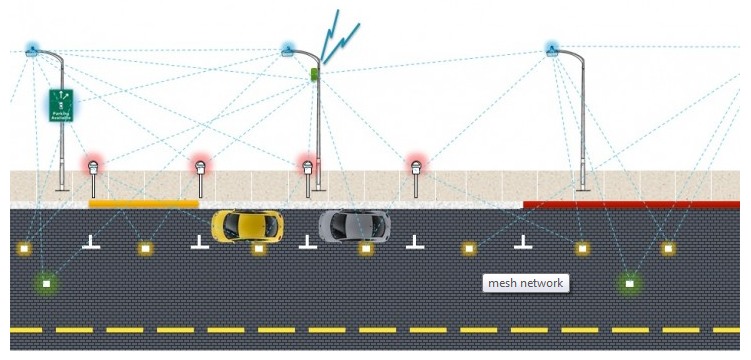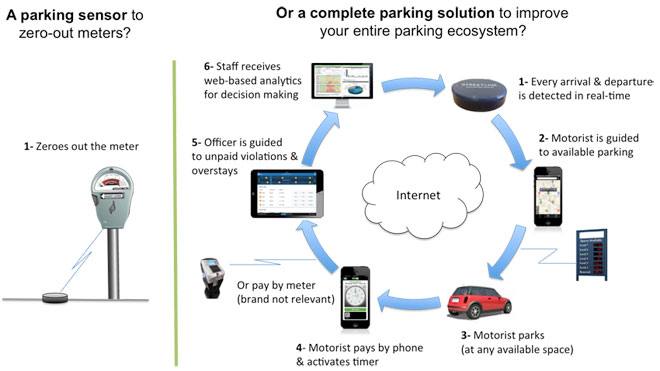Streetline – Leading the way for ‘Smart Parking’

Transforming parking through Internet of things to better your time, money, (smart) city and climate change…
Parking your car is among the most unpleasant daily experiences – it’s inefficient and mundane. It’s been like this for years, and with cities flocked with more cars everyday, it gets troublesome. Is there a scope for transformational change in Parking?
First thoughts on transforming parking – “At first glance, it’s just a way to find a parking spot. It has elements of social, mobile, analytics and cloud, but is it really doing anything more than giving directions to drivers on their mobile device so they can find open parking spaces in the city? Surely that’s just an incremental value-add, and hardly transformative. It’s just going to save me a few minutes in finding a spot.” [1]
Smart Parking has the ‘Hidden Disruption’ – The Big Picture
There are more than 2 billion parking spaces in the U.S.A, total of 70 million hours are spent each year looking for parking which represents a $1B loss to the economy.
In addition, 30% of city drivers are looking for parking and this adds about 10% to the average vehicle’s CO2 emissions. Smart parking can enable cities to better understand parking behavior and make policy changes that can improve conditions. This might include changes such as parking hours of operation, parking time limits, or even demand-based pricing. The result is that smart parking can enable cities to increase revenue by up to 20-30% and cities can achieve an ROI in 1-2 years. Recent case studies have shown sales tax revenues increased by 11.9%, a 30% reduction in greenhouse gas emissions, a 10% reduction in traffic, and an increase of 2% in local GDP. Reducing traffic and parking congestion improves commerce by making cities more accessible for all involved. [2]
STREETLINE – Revolutionizing Parking
Streetline, founded in 2005 has already handled more than 500 million parking events. They provide a comprehensive set of solutions from hardware and sensors to smart parking applications used by consumers, businesses and cities. They have secured support from companies like Qualcomm, Citigroup and Cisco. [3]
Breaking down their Operating Model
- Sensors are installed next to parking spots in cities and universities that relay information whether the spot is empty, using magnetometers and light sensitivity (in the near future, these sensors will capture temperature of the road, CO2 and humidity levels of the air). [4]
- The sensors are tied into municipality Wi-Fi networks, which are provided by Cisco.
- This data is fed into the Consumer-facing Streetline Parker App [5]
- Drivers, cities and businesses can access the real-time parking data through a monthly subscription model.
San Mateo and San Carlos, California were the first two cities to benefit, but Streetline has expanded to more than 30 cities in the US and is now expanding into Europe and Canada.
The Streetline Platform has 3 main pillars:
- Data Collection: Smart Parking System deploys machine-learning techniques to merge multiple data sources into a cohesive set of occupancy data for real-time parking guidance.
- Hybrid Analytics Platform: The Hybrid data analytics capabilities consume all possible existing parking data to refine accuracy and provide a comprehensive city-wide view of parking utilization.
- Product Solutions: A suite of mobile and web applications enable each key stakeholder in the parking ecosystem. [6]
The Business Model(s)
Streetline has evolved from focusing primarily on sensors to becoming more of “a data and apps company,” mentions CEO, Zia Yusuf. He now pitches it as part of the broader “Internet of Things” trend. Yusuf said the service “pays for itself,” because it helps cities price their parking spaces more effectively, for example by offering dynamic pricing based on demand from block to block. [7]
Revenue streams are spread across various stakeholders:
- Access to Parker Mobile App
- Parking payment through the app
- ParkEdge – Enterprise tool that enables public and private off-street parking to publish their parking spots in real-time
- Guided Enforcement platform for city municipality – enables city authorities in parking compliance and improvement
- Sofware-as-a-Service platform – ParkSight. It offers 24-7 data analytics that aid parking policy and pricing optimization.
Besides, Streetline also open sources the enormous amount of parking data it generates through APIs and SDKs. Streetline presents innovations that span across the concepts of ‘shared economies’, ‘smart-cities’ and ‘big-data-analytics’. [8]
So imagine what can happen when IoT in the smart parking space can enable opportunities for smart city operations? Predicting Air quality, road surface temperature, integrating with the connected car ecosystem can all become a reality.
What could be potential challenges?
Will surge pricing reduce willingness to pay for customers who would’ve utilized parking spots at fixed prices, leading to reduction in overall revenues?
Will it be easy to integrate parking sensor data safely and effectively with all the players – city municipality, environment regulators, smart car builders, and who will share the costs? [9]
[Word Count: 799]
[1]: The hidden disruption of digital business models http://www.computerworld.com/article/2838276/the-hidden-disruption-of-digital-business-models.html
[2]: The hidden disruption of digital business models http://www.computerworld.com/article/2838276/the-hidden-disruption-of-digital-business-models.html
[3]: 6 Companies working on Smart Parking http://www.nanalyze.com/2016/07/6-smart-parking-companies/
[4]: Streetline Partners with Cisco to bring Real-time Parking info to cities https://techcrunch.com/2012/12/04/streetline-cisco/
[5] Streetline – Solutions https://www.streetline.com/our-solutions/
[6] Streetline – How it works https://www.streetline.com/how-it-works/
[7] Streetline Raises 25 Million Round https://techcrunch.com/2013/01/10/streetline-series-c/
[8] Why the next great idea can come from anywhere anytime http://www.sbnonline.com/article/next-great-idea-can-come-anywhere-time/
[9] You’ve read about surge pricing, get ready for surge-priced parking https://www.washingtonpost.com/local/trafficandcommuting/youve-heard-about-surge-pricing-get-ready-for-surge-priced-parking/2015/11/07/4ff53f80-83ef-11e5-8ba6-cec48b74b2a7_story.html





Thanks for this post. I certainly can see the benefits of using streetline, both from the driver and city perspectives.
As a driver, its a great way to increase efficiency and predictability. Knowing exactly to which parking spot I am driving and getting efficient traffic directions saves time. Knowing in advance that the parking spot will be available and at which price, increases predictability. Seems like a must-have app for heavy parking users.
As a city, I think there are further benefits than what you described. From what I have seen, drivers looking for parking spots usually behave erratically and clog the streets by driving really slow on a lane. Given that a single driver’s behavior can create devastating ripple effects on a high-traffic transit system, I wonder whether a significant portion of traffic jams could be eliminated by using streetline on high-density urban areas?
Another idea is to use this data to provide transparency to the public of how parking spots, which are paid by citizens through taxes, are being utilized. I can imagine stats on average revenue per parking spot, % utilization, average availability, CO2 saved, time saved to citizens due to faster parking, time saved to citizens due to less traffic, etc…
Interesting post! As a former city driver, I have personally found that the biggest inhibitor to efficient parking is a lack of information with respect to parking rules. This has led to the development of apps such as Smooth Parking, which allows users to input the time and duration of their desired parking in order to locate available spaces.
I also wonder about the extent to which cities like New York have been disincentivized to ease the friction in the parking process. It is no secret that there are too many cars on the streets of New York, which increases congestion and lowers productivity. If there were less friction in the street parking process, perhaps more drivers from within the city as well as in neighboring areas would feel more comfortable about driving, which would only exacerbate the problem.
Interesting business model! Driving around to find a parking space in a busy area is always a painful experience. I can see the real benefit for drivers brought by Streetline. With the data collected, cities can also analyze parking lot utilization rate and facilitate future city planning to control traffic.
In terms of revenue stream, I think the biggest potential is with mobile payment commission and charging private parking lot operators a fee for monitoring and publishing real-time parking spot availability information. As the platform attracts more drivers, private parking lot operators will have more incentive to pay for the service and publish their parking spot on the platform.
Having lived in SF, I empathize with how much time is wasted circling around looking for open (and legal) parking spots! I’m glad that Streetline is finding creative and eco-friendly ways to solve this issue. In terms of cost sharing, I think high-traffic cities will be on board with helping integrate the parking sensor technology throughout their streets as the 2-year ROI timeline is short and demand-based pricing may allow them to actually recoup costs more quickly. With this technology, cities will also be able to reduce the number of parking enforcement workers they employ, saving them approximately $33K per worker per year [1]. As an additional revenue stream, I think Parker should target shopping centers (e.g., Westfield) and event companies (e.g., Coachella) where they can purchase Parker-only spots and charge higher fees to app customers in exchange for convenience. One concern I do have is how Parker will address issues such as troubleshooting meters or fixing broken sensors — cities may not have staff with the technical expertise to go out in field and address these issues. I wonder how Parker will allocate resources to help fix technical issues in a timely manner so that offline time does not negatively impact revenue.
[1] https://www.recruiter.com/salaries/parking-enforcement-workers-salary/